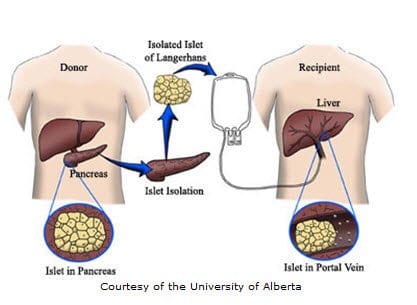According to a recent study, type 1 diabetic patients have found some very welcoming news after receiving pancreatic islet transplantation for complications derived from insulin treatments.
Type 1 diabetes patients who, over time, developed hypoglycemia (low blood sugar) as a complication from insulin injections found that upon receiving pancreatic islet transplantation they were able to regain normal internal recognition of the condition.
This study was led by researchers at the Perelman School of Medicine at the University of Pennsylvania on patients with severe hypoglycemia, a life-threatening complication of insulin treatment for type 1 diabetes. Hypoglycemia (low blood sugar) can cause irritability, confusion, lightheadedness, shakiness, shortness of breath and seizures.
Study leader, associate professor of Medicine and medical director of the Pancreatic Islet Cell Transplant Program at Penn Medicine, Michael R. Rickels, MD, MS said, “The results of this study suggest that islet cell transplantation may be an effective treatment for patients with type 1 diabetes who are experiencing significant hypoglycemic events because their body isn’t able to recognize their low blood sugar levels. Currently, islet cell transplantation is considered investigational for type 1 diabetes patients, but this study shows that it has the potential to dramatically improve a patient’s ability to defend against and recognize symptoms of hypoglycemia and eliminate severe hypoglycemic episodes.”
Type 1 diabetic patients who suffer from hypoglycemia unawareness, which means their blood sugar is low but they feel no symptoms, were able to become more alert to their condition and were able to increase their blood sugar levels within six months through this transplantation. For patients who have this transplantation, pancreatic islet cells are used from deceased donors.
The tiny clusters of cells known as pancreatic islets are contained within the pancreas that contain many other types of cells, some of them produce insulin, which helps the body to process sugar.
Rickels said, “Now that we’ve seen improvement in the protection against hypoglycemia as a result of islet cell transplantation, we’re evaluating the longer term durability of these restored defense mechanisms.”
